
Top book recommendations from UF Warrington
Faculty and staff across the Warrington College of Business selected their recommendations for books to read this year. See their selections and what you’ll get out of reading each in the list below.
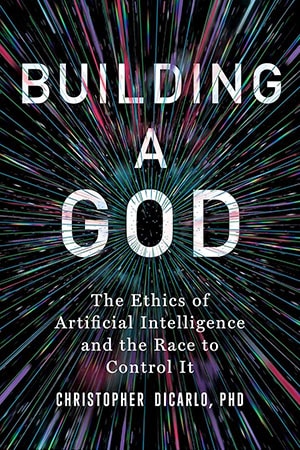
Building a God: The Ethics of Artificial Intelligence and the Race to Control it | Christopher DiCarlo
“In Building a God, Christopher DiCarlo explores the profound implications of artificial intelligence surpassing human intelligence—a destiny that seems not just possible, but inevitable. At this critical crossroad in our evolutionary history, DiCarlo, a renowned ethicist in AI, delves into the ethical mazes and technological quandaries of our future interactions with superior AI entities.
From healthcare enhancements to the risks of digital manipulation, this book scrutinizes AI’s dual potential to elevate or devastate humanity. DiCarlo advocates for robust global governance of AI, proposing visionary policies to safeguard our society.
AI will positively impact our lives in myriad ways: from healthcare to education, manufacturing to sustainability, AI-powered tools will improve productivity and add ease to the most massive global industries and to our own personal daily routines alike. But, we have already witnessed the tip of the iceberg when it comes to the risks of this new technology: AI algorithms can manipulate human behavior, spread disinformation, shape public opinion, and impact democratic processes. Sophisticated technologies such as GPT-4, Dall-E 2, and video Deepfakes allow users to create, distort, and alter information. Perhaps more troubling is the foundational lack of transparency in both the utilization and design of AI models.
What ethical precepts should be determined for AI, and by whom? And what will happen if rogue abusers decide not to comply with such ethical guidelines? How should we enforce these precepts?”
– Brian Ray, Director of the Poe Business Ethics Center and Instructional Professor of Leadership and Ethics, Management
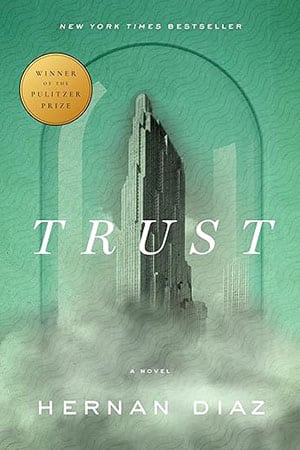
Trust | Hernan Diaz
“Even through the roar and effervescence of the 1920s, everyone in New York has heard of Benjamin and Helen Rask. He is a legendary Wall Street tycoon; she is the daughter of eccentric aristocrats. Together, they have risen to the very top of a world of seemingly endless wealth—all as a decade of excess and speculation draws to an end. But at what cost have they acquired their immense fortune? This is the mystery at the center of Bonds, a successful 1937 novel that all of New York seems to have read. Yet there are other versions of this tale of privilege and deceit.
Hernan Diaz’s Trust elegantly puts these competing narratives into conversation with one another—and in tension with the perspective of one woman bent on disentangling fact from fiction. The result is a novel that spans over a century and becomes more exhilarating with each new revelation.
At once an immersive story and a brilliant literary puzzle, Trust engages the reader in a quest for the truth while confronting the deceptions that often live at the heart of personal relationships, the reality-warping force of capital, and the ease with which power can manipulate facts.”
– Larry DiMatteo, Huber Hurst Professor, Management
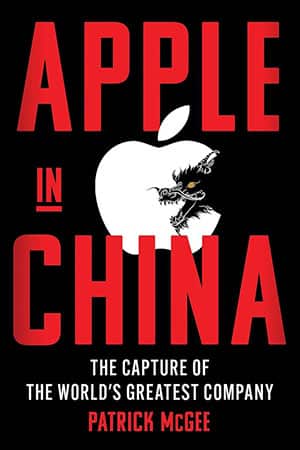
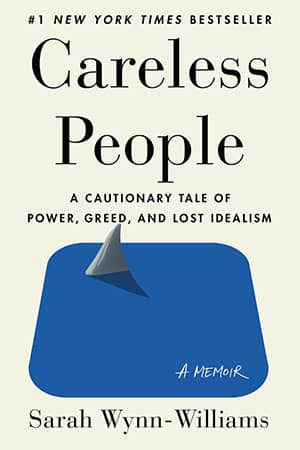
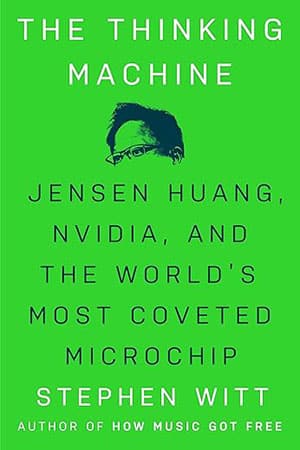
Apple in China: The Capture of the World’s Greatest Company | Patrick McGee
Careless People: A Cautionary Tale of Power, Greed, and Lost Idealism | Sarah Wynn-Williams
The Thinking Machine: Jensen Huang, Nvidia, and the World’s Most Coveted Microchip | Stephen Witt
“These three books provide important insights into applying Porter’s five forces. ‘Apple in China’ and ‘Careless People’ discuss how Apple’s and Meta’s engagements in and with China led them into competitively weak positions. Apple’s suppliers are largely located in China and China consumers provide nearly 20% of Apple’s revenue.
This would ordinarily not be a problem, except that China’s political structure enables it to control two of Porter’s five forces, acting as a monopolistic supplier and as a monopsonistic buyer. China also took in Apple’s and Meta’s proprietary technologies, which led to the development of substitute products.
In contrast, ‘The Thinking Machine’ tells the story of a niche player, Nvidia, becoming an industry leader by focusing on the needs of a small number of customers that were largely ignored by other computer chip makers, and yet were on the leading edge of what AI could become.”
– Mark Jamison, Director and Gunter Professor, Public Utility Research Center
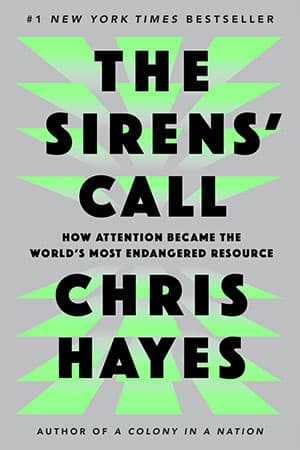
The Sirens’ Call: How Attention Became the World’s Most Endangered Resource | Chris Hayes
“The Sirens’ Call offers a powerful mix of history, science, politics, and personal reflection to explain why attention matters—and how reclaiming it might be essential for our future.”
– Elizabeth Hauck, Executive Assistant and Donor Relations Coordinator, Development & Alumni Affairs
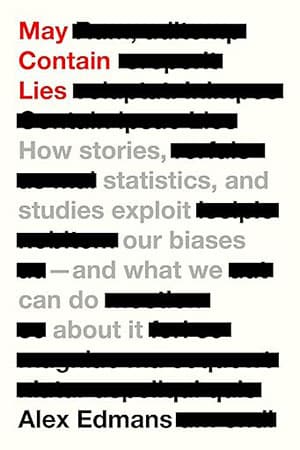
May Contain Lies: How Stories, Statistics and Studies Exploit Our Biases – And What We Can Do About It | Alex Edmans
“May Contain Lies is an engaging, accessible guide that will help the business school community distinguish between persuasive stories and reliable evidence, recognize their own biases, and make smarter, more ethical decisions in a world full of information and misinformation.
Edmans offers insights in several areas, including:
Sharpened Critical Thinking:
Edmans introduces the ‘Ladder of Misinference,’ a framework for understanding how even accurate facts can be misinterpreted. Readers learn to dissect claims, statistics, and stories—skills essential for business analysis, research, and leadership.
Bias Awareness:
The book explores how cognitive biases, like confirmation bias and black-and-white thinking, can mislead even sophisticated audiences. Edmans uses vivid business and real-world examples to show how stories and studies can subtly exploit these biases.
Practical Tools:
Each chapter offers actionable checklists and summaries, empowering readers to evaluate evidence, research, and business advice more effectively. These tools are directly applicable to case studies, consulting, and strategic decision-making.
Challenging Business Narratives:
Edmans critiques the business world’s reliance on anecdote and authority, urging a shift toward more scientific, critical evaluation. This is particularly relevant for business school environments, where stories often stand in for rigorous evidence.
Ethical and Strategic Value:
The book also addresses how to foster transparency and integrity in organizations, offering guidance for due diligence and whistleblowing—important for future leaders and practitioners alike.”
– Scott Nestler, Professor of Practice, Information Systems & Operations Management and UF College of Health & Human Performance Sport Management
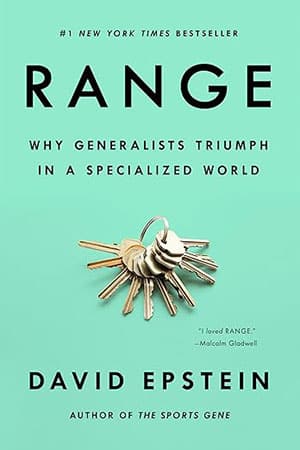
Range: Why Generalists Triumph in a Specialized World | David Epstein
“The book provides an insightful look at why a broad range of skills, interests, and knowledge is fundamental to solving wicked problems, especially in today’s world. Epstein uses compelling accounts of some of the world’s most famous athletes, artists, inventors, and scientists to highlight his point that people who experiment and diversify are equipped to handle some of the toughest problems faced in many domains. Epstein argues for generalization over specialization. I believe this book is important to understanding the role of humans in an AI-driven world. The book itself is not about AI, but about how people think, reason, and learn in an environment that produces new challenges every day.
On a side note, this book references and is the counter argument to Grit by Duckworth, which is another interesting read.”
– Cheryl Aasheim, Clinical Associate Professor, Information Systems & Operations Management
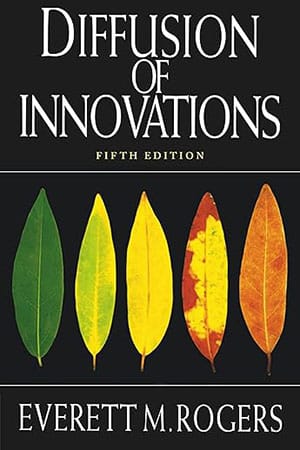
Diffusion of Innovations | Everett M. Rogers
“Diffusion of Innovations is a great book for understanding the flow of human behavior regarding adopting new things. Innovations can be anything from behaviors to technology. In this book Rogers breaks down the factors that impact adoption of an innovation. He also describes the normal stakeholders and provides guidance on getting an innovation adopted.
Originally, the theory of diffusion of innovations was used in the mid 20th century to help extension agents convince farmers to adopt better farming practices post WW2. Today it is a cornerstone of communication and education theory. Leaders may often be asked to bring a team on board with something that they may not want to do. This book provides the blueprint for understanding that process and how to be as effective as possible. This book is not a manual for convincing people to do what you want. This book is a manual for setting yourself up for success in communication and implementation.”
– Heath Davis, Student Engagement Coordinator, University of Florida MBA Programs
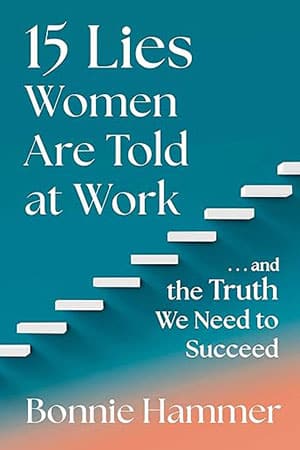
15 Lies Women Are Told at Work: …And the Truth We Need to Succeed | Bonnie Hammer
“I watched CNBC in May, and Bonnie Hammer appeared as a guest again. I remember the first time I saw her on the network a few years ago, and I’ve followed aspects of her career with admiration. As Vice Chair of NBCUniversal, Bonnie has had an incredible run, helping to shape some of my favorite shows, including Mr. Robot (a must-see, especially if you like the rogue programmer genre). What makes her stand out, though, is her candor. She speaks with the clarity and directness of someone in the room where the real decisions were made, and her advice reflects that.
After reading (and listening via Audible) 15 Lies Women Are Told at Work, I found myself nodding. Her insights aren’t just relevant for women; they’re helpful for anyone navigating today’s workplace, especially Gen Z professionals entering the workforce. Her message is sharp: success doesn’t come from pretending (i.e., fake it till you make it) or waiting your turn; it comes from taking authentic, often uncomfortable action. You’re not entitled to a dream job just because you want it (or attended a top-tier university); you have to seize the opportunities that come your way, even when they’re not part of your original plan. She debunks the myth of ‘having it all’ and instead encourages thoughtful trade-offs and intentional choices. What resonated most with me is her emphasis on personal relationships, which open doors more easily when you’ve built trust and connection (as I found throughout my career, from unexpected places). Her career wisdom is real, usable, and worth revisiting, so I often weave her guidance into the advice I share with others.”
– Michael Carrillo, Clinical Assistant Professor, Marketing
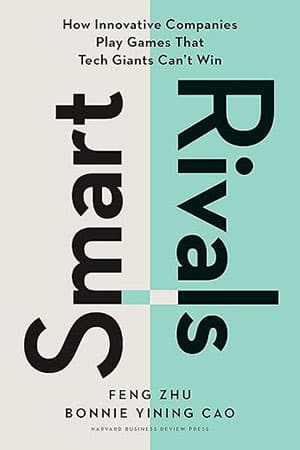
Smart Rivals: How Innovative Companies Play Games That Tech Giants Can’t Win | Feng Zhu and Bonnie Yining Cao
“Smaller firms often have to play different “games” entirely to win against larger, resource-rich opponents. “Smart Rivals” is a must-read for anyone interested in the dynamics of competition in the digital age. This insightful book offers a refreshing perspective on how smaller companies can punch above their weight and succeed against the odds. With its mix of theory, real-world examples, and practical advice, the book serves as both a strategic guide and a source of inspiration for anyone looking to outsmart the tech giants.
The writing of the book is clear and engaging, making complex strategic concepts accessible to a wide audience. The case studies are well-chosen and varied, ranging from tech startups to established companies that reinvented themselves to compete more effectively.
The authors also bring a nuanced understanding of the limitations faced by tech giants, providing a balanced view that acknowledges both the strengths and vulnerabilities of these behemoths. The authors do not just analyze what successful companies have done; they also offer actionable insights that readers can apply in their own ventures. Their emphasis on strategic creativity and flexibility is especially relevant in today’s rapidly changing business environment.”
– Liangfei Qiu, PricewaterhouseCoopers ISOM Professor, Information Systems & Operations Management

The Future of Higher Education in an Age of Artificial Intelligence | Stephen Murgatroyd
“Colleges, universities and other higher education institutions are displaying a high degree of uncertainty and caution with respect to the adoption and use of AI. Concerns related to security, privacy, and academic misconduct act as cautions, though some are pioneering imaginative and creative uses of AI in teaching, learning, assessment and support services. This book explores the landscape of AI adoption and suggests ways in which AI can be deployed to improve learning and assessment. It also examines ethical and change management implications of AI.
A strong focus on ethical AI, the use of AI for regenerative thinking and a shift to problem and project-based learning are all explored.”
– Brian Ray, Director of the Poe Business Ethics Center and Instructional Professor of Leadership and Ethics, Management
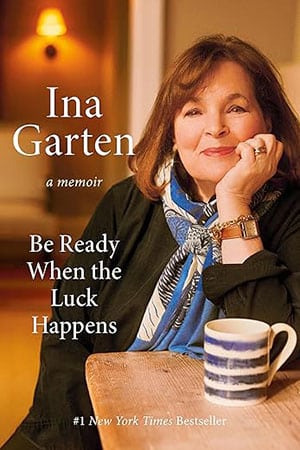
Be Ready When Luck Happens: A Memoir | Ina Garten
“From a difficult childhood to meeting the love of her life, Jeffrey, and marrying him while still in college, from a boring bureaucratic job in Washington, D.C., to answering an ad for a specialty food store in the Hamptons, from the owner of one Barefoot Contessa shop to author of bestselling cookbooks and celebrated television host, Ina Garten has blazed her own trail and, in the meantime, taught millions of people how to cook and entertain. Now, she invites them to come closer to experience her story in vivid detail and to share the important life lessons she learned along the way: do what you love because if you love it you’ll be really good at it, swing for the fences, and always Be Ready When the Luck Happens.”
– Jamie Kraft, Director, Entrepreneurship & Innovation Center
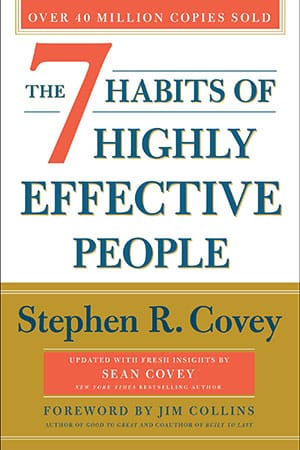
The 7 Habits of Highly Effective People | Stephen R. Covey
“Students and alumni will gain timeless, practical strategies for personal and professional growth. Covey’s framework equips readers with tools to become more self-aware, intentional, and purpose-driven—starting from developing self-discipline and proactive habits, to mastering communication, collaboration, and leadership.
This book fosters a mindset shift from reacting to life to leading it—with integrity and clarity. By internalizing the 7 habits, readers learn how to set meaningful goals, prioritize what matters most, build trust in relationships, and commit to continuous improvement. Whether navigating college, launching a career, or leading a team, this book provides a compass for effectiveness and fulfillment at every stage.”
– Isis Bennett, Global Advisor, Heavener School of Business
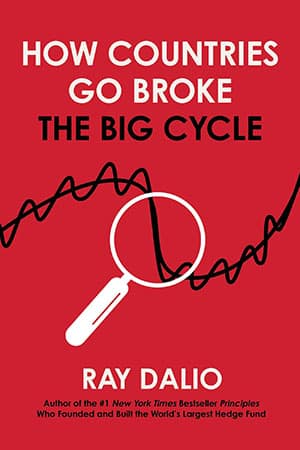
How Big Countries Go Broke: The Big Cycle | Ray Dalio
“Students can understand debt and when it grows faster than income the deleveraging process can be painful. The book offers both a theoretical and practical case study. Alumni can learn about global and macro trends in financial markets.”
– Eddie Sanchez, Clinical Assistant Professor, Finance, Insurance and Real Estate

Inside Mercedes F1: Life in the Fast Lane | Matt Whyman
“The book is a comprehensive year-long look at how one of the most successful Formula 1 teams ever struggled to get back to the top after long its dominance of the sport. It is by award winning journalist Matt Whyman. The team in question, Mercedes-AMG-Petronas, is a multi-million-dollar affiliate of Mercedes-Benz with 2,000 employees. It is engaged in competition, engineering, and marketing at the highest level of motor sports.”
– Brian Gendreau, Clinical Professor of Finance, Finance, Insurance and Real Estate
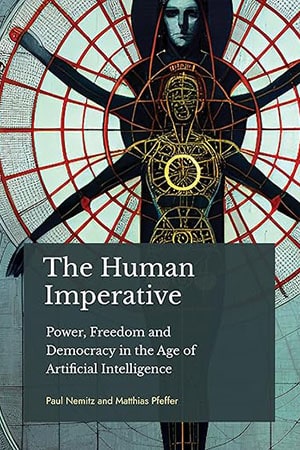
The Human Imperative: Power, Freedom and Democracy in the age of Artificial Intelligence | Paul Nemitz and Matthias Pfeffer
“This book is about power in the age of Artificial Intelligence. It looks at what the new technical powers that have accrued over the last decades mean for the freedom of people and for our democracies. AI must not be considered in isolation, but rather in a very specific context; the concentration of economic and digital-technological power that we see today. Analysis of the effects of AI requires that we take a holistic view of the business models of digital technologies, and of the power they exercise.
Technology, economic power, and political power are entering into ever closer symbiosis. Digital technologies and their corporate masters now know more than people know about themselves, or governments know about the world. These technologies accumulate more and more decision-making powers. Taken together this leads to a massive asymmetry of knowledge and power in the relationship between man and machine.
The classical models of action and decision-making in democratic societies are being gradually undermined by such developments. In a new way, the question of the control of technical power arises. This is the first book to look in detail in a holistic way at the challenges of digital power and AI to democracy and liberties, and to set out what can and needs to be done about these challenges in terms of policy making and legislation.”
– Brian Ray, Director of the Poe Business Ethics Center and Instructional Professor of Leadership and Ethics, Management
Related stories
For the media
Looking for an expert or have an inquiry?
Submit your news
Contact us
Follow us on social
@ufwarrington | #BusinessGators